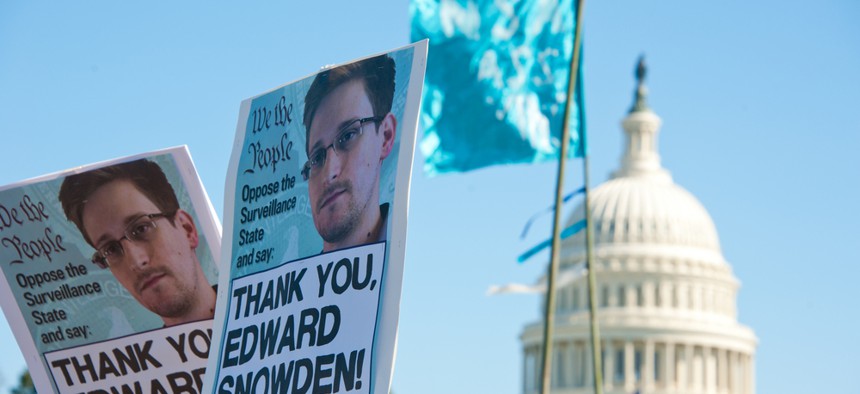
Rena Schild/Shutterstock.com
Should Edward Snowden Get His Passport Back?
Activists have gathered 100,000 signatures on a petition pleading with the State and Justice departments to do exactly that.
On Wednesday, an alliance of pro-whistleblower activists is set to deliver petitions containing more than 100,000 signatures to the State and Justice Departments demanding that former National Security Agency contractor-turned-leaker Edward Snowden have his passport reinstated so that he can end his current exile in Russia.
The petitions are addressed to Secretary of State John Kerry and Attorney General Eric Holder. They call Snowden, who formerly worked with highly classified telephone metadata in the Hawaii office of Booz Allen Hamilton, “a whistleblower who has educated the public about threats to our privacy and precious constitutional rights.” The petitions urge officials “to make an unequivocal public commitment not to interfere with [Snowden’s] travels or political asylum process.”
The push comes as President Obama has given some ground to critics and prepared a proposal to reform the controversial NSA domestic surveillance program to limit its scope.
The administration’s nine-month freeze on Snowden amounts to “blaming the messenger,” said Norman Solomon, co-founder of RootsAction.org and a founding director of the Institute for Public Accuracy, speaking on a panel to reporters at the National Press Club in Washington. Citing the Homeland Security Department’s slogan, “if you see something, say something,” Solomon credited Snowden with “seeing something and saying something.”
“The credibility of the White House has gone through the floor, while the credibility of Snowden continues to ascend,” he said.
Co-panelist Ray McGovern, a 27-year veteran of the CIA who as a whistleblower defender visited Snowden in Moscow in October, said his six hours with the leaker convinced him that Snowden “is the real deal.” He said Snowden’s co-workers have testified that when he tried to complain about the scope of the NSA’s surveillance powers, he was told “to forget about it.” McGovern blasted Director of National Intelligence James Clapper as “untruthful.” Clapper testified under oath in March 2013 that the NSA was not tracking Americans’ phone calls. He later amended his testimony.
McGovern mocked the NSA as standing for “no such amendment,” saying that former NSA Director Michael Hayden’s interpretation of the Fourth Amendment ban on unreasonable search and seizure treated the text as if it did not include the phrase “probable cause.”
Hayden, reached for comment by Government Executive, said, “the NSA operates under a principle of reasonable search and seizure. But not all searches require a warrant -- to wit, to get on an airplane.”
“When a warrant is required, it must be based on probable cause,” Hayden said. “The broad requirement under which NSA operates is that searches must be reasonable. But there are many searches our government conducts that don’t require a warrant, like when you cross the American border -- suspicion is not required.”
Asked whether Snowden’s passport should be reinstated, Hayden said, “for the purpose of returning to the United States to stand trial, I would be fully supportive.”
President Obama, McGovern said, “isn’t good at telling the truth” when he argues that a policy directive he issued in October 2012 would have allowed Snowden, a contractor, to take his complaints through channels and receive protection against retaliation. “I don’t know that Obama knows what’s going on or whether it’s a deliberate coverup with plausible deniability,” he said. Obama’s decision not to prosecute CIA employees for “torture” under the George W. Bush administration, he added, “makes me think he’s scared of these intelligence folks who are still walking the halls of the CIA and writing books.”
Coleen Rowley, the former FBI special agent who detailed missed opportunities during the run-up to the 9/11 terrorist attacks, said the Snowden episode represents “a sea change” and a “moment in which people are waking up.” Comparing the current situation to the intelligence scandals that emerged in the 1970s in which domestic anti-war activists and senators were spied upon by the government, she called for a “new Frank Church Committee” type of investigation and hearings in which Snowden would be the “first witness.”
Rowley credited Obama’s coming reforms of NSA operations as “the first tiny baby steps.”
(Image via Rena Schild / Shutterstock.com)







